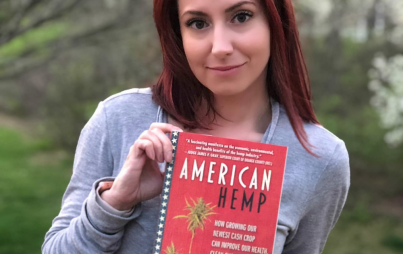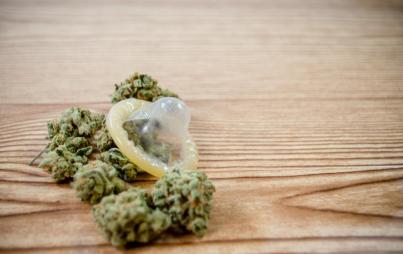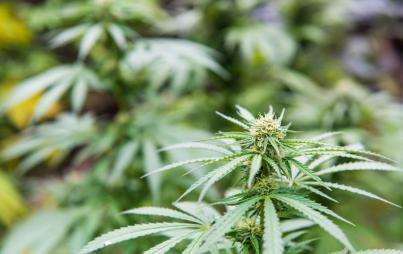
We don't all love it.
One doctor described it like this: Imagine that every person stands on a mountain, and the cliff represents where sanity ends and craziness begins. Each person begins life in some relation to that cliff. Some are born right on it, others a few feet away, others nowhere near it.
Call me a killjoy. Go ahead. You’re talking to someone whose idea of a good time is a glass (maybe two) of wine and conversation surrounding topics like Kant, Kafka, the joys of the typewriter.
But the way I see it, concerning the issue of legalizing pot we have two questions: 1) Whether a person has the right to get high, and 2) Whether that right supersedes the rights of other potentially affected parties. I’m not going to try and argue for or against #1. If they so desire, people will mess with their own minds. But on question #2, I have nursed some serious reservations about widespread access to legalized pot ever since weed enthusiasts raised the state-sanctioned cannabis flag.
In 2012, Colorado and Oregon became the first states to allow marijuana use for recreational purposes. Old news.
Here are a few items of new news you may want to consider before jumping on the pot-for-all bandwagon.
The teenage brain on weed: forever, irrecoverably dumber.
The problem is the particularly pernicious effects of marijuana on a teenage brain. Krista Lindahl, the University of Wisconsin’s brain imaging and neuropsychology lab director, told NPR that the teenage years are “the absolute worst time” to use pot. That’s because the brain is in its crucial transformation from child to adult thinking capabilities. Pot impairs learning, hinders memory, and lowers IQ. In one study, Duke researchers found that teenagers who began smoking pot lost up to 8 IQ points over the course of adulthood. Eight may not sound like a lot, but it’s nearly a whole standard of deviation.
Additionally, chronic marijuana use can result in depression, mania, and anxiety. One doctor described it like this: Imagine that every person stands on a mountain, and the cliff represents where sanity ends and craziness begins. Each person begins life in some relation to that cliff. Some are born right on it, others a few feet away, others nowhere near it. Tetrahydrocannibinol (THC — the potent ingredient in marijuana) will push everyone closer to the cliff’s edge. So maybe you smoke pot, and you’re just fine. Or maybe not: we simply don’t know ahead of time where our biology has landed us on that sanity spectrum.
Now consider that a recent federal survey found a whopping 60% of high school students view marijuana as perfectly safe. Legalizing it can only make that stat worse; normalizing weed will inevitably push more people off the cliff.
To wit: in Colorado, the rate of teenagers using marijuana is (no drum roll necessary) higher than the national average. According to DenverHealth.org, “28% of Denver high school students reported use within the past 30 days, compared to 22% in Colorado and 23% in the United States.”
Yikes.
Marijuana is addictive. Just ask David Foster Wallace.
This is where pot proponents tend to throw down. They will cite all sorts of evidence proving that marijuana is utterly benign. That other drugs like nicotine and cocaine and heroin are so much more addictive, and marijuana shouldn’t even be in the same category.
Clearly, they’ve never read Infinite Jest. I hadn’t really considered taking up weed, but after I read David Foster Wallace’s signature masterpiece, I developed an abject terror of the stuff. One of his main characters is most definitely addicted to pot, and the book’s depiction of his struggle to quit is a harrowing damnation of all those Goldilocks fairytales.
I also had a college roommate who tried weed and had to be taken to the emergency room immediately, so you know, it’s not always breezy in the land of mary-j-wana.
Health experts estimate that 9% of users will become clinically addicted, though that number will almost certainly rise if marijuana becomes readily, legally, affordably available.
But as Dr. J. Wesley Boyd writes for Psychology Today, physical addiction is only half the story. “’Addiction’” refers to behaviors that are compulsive, partially out of control or worse, and often escalating in severity and intensity.” He then relates the story of one of his patients, whose devotion to weed smoking cut out other aspects of life. It took up time he would otherwise invest in relationships, exercise, hobbies, and school.
I hear the libertarian battle cry coming: Adults should be free to screw up their own lives! OK, but when an adult can’t hold down a job because of excessive pot use becomes dependent on welfare, we pay for that. An adult who gets high and drives puts everyone around her in danger, so we have a vested interest in minimizing that possibility. And what about all those . . .
Parents who leave pot candy in child sight
Dozens of children have been hospitalized for overdosing on THC. The rate of kids exposed to THC is up 145%. In Colorado, you can now buy your high in cute little gummies and ribbon-wrapped cookie packaging.
I mean, what kid wants to eat stuff like that?
Dr. George Sam Wang, a fellow at the Rocky Mountain Poison and Drug Center, told US News, "We are seeing increases in exposure to marijuana in young pediatric patients, and they have more severe symptoms than we typically associate with marijuana.”
No one can fix the problem of selfish, idiot parents. But we can make it harder for their neglectful habits to wreak potentially fatal harm from THC overdose. It’s easy: keep it illegal.
Fido and Fluffy go to the Animal ER
Have I seen college boys purposefully give their dogs beer? I have. So am I surprised that the same moronic cruelty is happening now with marijuana? Not at all. But I’ll let you share in the sadness with this quote from an NPR story chronicling the recent uptick in animal cases of THC ingestion:
"What's worrying to us is the severity of cases now," says Dr. Heidi Houchen, a veterinarian at Northwest Veterinary Specialists in Clackamas, Ore. "We still see the classic case: red eyes, wobbly, urinating on themselves, a little twitchy . . . but they can progress through the sedate, leaning, urine-dribbling stage to becoming completely comatose or absolutely rigid. They've come in and had seizures. They can come in a panic, really sensitive to noise and touch. They can pass away."
♦♦♦
We haven’t even covered the rising rates of DUI for weed, the epically higher concentration in THC today compared to the '90s, and the harrowing violence some new users have displayed . . .
But there are already plenty of solid reasons to reject legalized marijuana. Its nasty repercussions too often harm the innocent and vulnerable: teens, children, and pets.
The right of an adult seeking his Mile High hit doesn’t appear more important than the right of a teen to not permanently damage her brain, or a child to avoid an ER trip because he wanted some gummy bears. Or the right of Fido to, you know . . . live.







